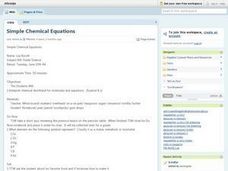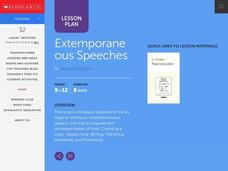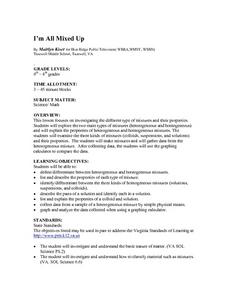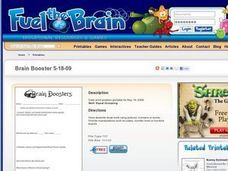Curated OER
Simple Chemical Equations
Eighth graders interpret the chemical symbols and shorthand used for molecules and equations. Through guided practice, 8th graders work to decipher and interpret the symbols for chemical equations. An opportunity for independent...
Curated OER
Pirate Map
Students write directions explaining how to get from one location to another by using a map of their town and use simple maps to identify and locate places.
Curated OER
Extemporaneous Speeches
Students perform the six steps of writing an extemporaneous speech including, choosing a topic, researching, writing, practicing delivering and processing.
Hawaiʻi State Department of Education
ABA Form in Music
Patterns happen everywhere, in music, math, and language! Fourth graders listen to the "William Tell Overture" visualizing the patterns that they hear. They then discuss and write an ABA poem that matches the ABA form found in the music...
Curated OER
Computers At Work
Students develop simulated businesses, and identify the ways in which their businesses might use computers. They write job descriptions and help wanted ads for the employees who would be responsible for using computers in their businesses.
Curated OER
Using Timelines
Students explore how to create a simple timeline and make one of their life.
Curated OER
Magical Maps
Second graders discuss the importance of using maps and how they are used. After they listen to a folktale, they develop their own story line maps and write their own folktale to accompany a map. They also identify and locate the seven...
Curated OER
Create a Food Chain
Students discover the connection between plants and animals by discussing simple food chains. Students explore what may happen when parts of a food chain are removed. Students wrap up the lesson by writing a story about a food chain.
Curated OER
Can You Haiku?
Everyone loves haikus! They're short, quick, and fun to write! Analyze the rules and conventions of haiku. Readers interpret examples of haiku and develop a vocabulary for writing haiku. Then they compose a haiku based on a personal...
National Security Agency
Sampling for a Rock Concert
Over the course of three class periods, middle schoolers design an experiment to provide learner input to administration about which rock band to invite to play at school. They practice several random sampling exercises, all well...
Curated OER
Math Series
Even though this activity is just a simple review of estimation, it is a fast and easy way to explore this topic. Young mathematicians estimate the number of items contained in two jars and discuss their answers. Afterwards, they can use...
Curated OER
Getting To Know You
Students use personal information to enter into a teacher generated database. The focus is upon name recognition and promoting socialization with classmates. Word recognition is emphasized with the simple development of basic computer...
Curated OER
3-D Multicultural Ornaments
Students create and color three-dimensional ornaments reflecting December's many cultural celebrations. They decide which symbol they wish to create as an ornament, draw or trace the outline of the symbol, and follow directions as they...
Curated OER
The World's Simplest Cartesian Diver
Have your class learn about buoyancy using this simple lesson. First, they bring in condiment packets and see what happens when they place it in a glass of water. Then, they use one of the packets to illustrate the concept of a Cartesian...
Autism Inspiration
Why We Use Our Words
Here is a lesson designed for children with autism which is aimed at helping them understand that using their words to express what they need is an important social skill. They are charged with using their words to explain to the teacher...
Curated OER
Avoir, Être, et Le Passé Composé
The instructional activity begins with direct instruction: how and when do we use avoir and être to form the past tense? After identifying the verbs that use either avoir or être, French learners write about five things they did the week...
Curated OER
Ocean Life: A Heavy Subject
Second graders examine The Learning Page Fact Files about ocean life and categorize the data by weight and group. They distinguish between fish, mammals, and invertebrates and which weigh the most and the least. Students record their...
Curated OER
Relate Addition and Subtraction Reteach 14.7
Introduce young scholars to relationship between addition and subtraction with this very simple worksheet. There are 2 problems to solve, each problem shows unifix cubes relaying an addition problem and its subtraction companion.
Curated OER
How Do I Get There? Planning a Safe Route to School
One much-needed skill for young learners is direction giving. Have your class plan and draw a safe route for them to travel from home to school. They will also draw places and items that are in between home and school in order to build a...
Education Center
Safety Sequence
Follow up a class reading of the children's book Officer Buckle and Gloria with this simple sequence-of-events worksheet. Including pictures of six key moments from the story, young learners must first number them in the correct order...
Curated OER
I'm All Mixed Up
Middle school scientists compare and contrast heterogeneous and homogeneous mixtures. They differentiate solutions, colloids, and suspensions by examining samples of each. Note that the bulk of the lesson plan directs you how to...
Curated OER
What is Your Story?
Young scholars listen to Picnic In October and Memory Coat to explore the concept of memoirs. They interview a family member and write a personal memoir that reflects their own family history.
Curated OER
More Joy of Abstract Nouns 1
Students are provided with a list of 20 adjectives that they must generate abstract nouns to match. For example, the first term, luxurious, would prompt the answer luxury. Directions for this activity explain that abstract nouns don't...
Curated OER
Division with Equal Grouping
Young math wizards solve two story problems in which simple division (with leftovers) is used. They draw pictures or write to explain their answers.

























